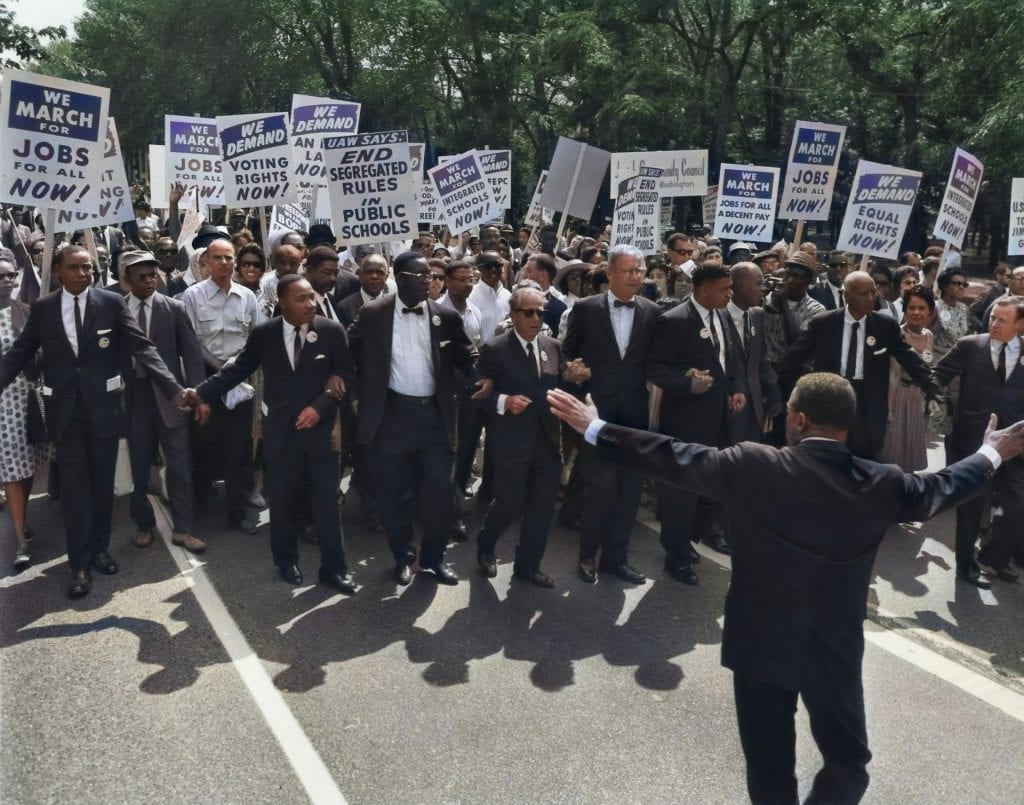
“Today I want to say to the people of America and the nations of the world, that we are not about to turn around. We are on the move now…. Let us march on segregated schools until every vestige of segregated and inferior education becomes a thing of the past, and Negroes and whites study side-by-side in the socially-healing context of the classroom.” – Rev. Dr. Martin Luther King, Jr. March 25, 1965[1]
The words of Rev. Dr. Martin Luther King, Jr., whose memory we celebrate in the coming week, are an eloquent reminder for all races and ethnicities that dreams have not been defeated. This is not a post-utopian era. Utopias are alive in the hearts of all who struggle to build true democracies in which all people, especially the “most abandoned” (as Vincent de Paul called them), can finally live with dignity. The memory of Dr. King should always awaken a belief that a better world is still possible.
History is a continuum—in the utopia of yesterday, the reality of today was incubated, just as new realities will breathe from the utopias of today. The utopia of one century often becomes a simple fact of the next century. Utopian vision is the beginning of all true progress and the design of a better future. I believe it’s not too late to make real Dr. King’s utopia of a just world in which people of all cultures and races are treated equally and given the same opportunities to flourish.
In our encounters within the Vincentian Family, we constantly realize that our creativity is not exhausted and that we are still too far away from the realization of a world in which all forms of life are respected and protected. We must ensure ‘the most abandoned,’ as Vincent called them, are taken care of, and provided with everything they need to live with dignity.
In a 1965 sermon, Dr. King explained that the “majestic words” of the Declaration of Independence, “all [people] are created equal,” were the foundation of the Civil Rights Movement.[2] He did not see that document as a lie but as an unfulfilled promise, “raised to cosmic proportions,” that the movement was now struggling to realize. When we see the unbearable suffering of so many people in the United States, especially so many people of African descent, we understand the current challenges of the movement Dr. King championed.
DePaul University is built on top of this same foundation, this universal truth. Vincentian understanding recognizes the dignity of every human story, and especially those persons that are broken because of systemic injustice, structural poverty, inequity, exclusion, or social and racial discrimination. We recognize the essential equity among all human beings of so many diverse backgrounds.
In many places of the world, I have seen a growing movement of intersectional liberation and social transformation. We, the Vincentian Family, are bearers of just part of this seed of life that has been entrusted to all races, religions, cultures, social classes, and nations of the earth. This seed is hidden in the heart of the Vincentian charism, a charism that belongs to the reign of God and his justice. It is deeply connected with all the other seeds entrusted to humanity to make dignified life on our planet possible and sustainable. The vitality and relevance of the Vincentian spirit can only be guaranteed if a connection with this universal movement is kept alive.
The Vincentian charism is pro-cultural. We are at the crossroads of history alongside the excluded of the earth, and of the earth itself, and our horizon is the same that the universal movement of justice and peace envisions: “a new heaven and a new earth”![3] The systemic racial justice of Dr. King’s utopia is a Vincentian issue that we embrace from our own convictions and for our vocation. His dream is not strange to us. Our Vincentian sociology, theology, and anthropology naturally bring us to this cause. We are on the move, marching with God for a world free of hate. DePaul should be a school where the equitable new world is designed, where students of all racial identities and diverse cultural backgrounds come together “side-by-side in the socially-healing context of the classroom” as Dr. King envisioned in 1965. That is the dream.
In 2022, the memory of Reverend Dr. Martin Luther King Jr. can give us all the elements we need to understand that the emancipatory movement is urgent today and needs support from every angle. It is deeply connected with all social and environmental movements of liberation and transformation.
We are on the move, we cannot stop marching, and we won’t turn around now! We will continue resisting the hegemonic ego- and capital-centric narratives that are destroying our planet, making life unsustainable, and oppressing human beings. It is an urgent necessity that all human, social, and environmental movements of systemic change work together side by side to be effective. As Dr. King said, “The battle is in our hands. And we can answer with creative nonviolence the call to higher ground to which the new directions of our struggle summons us. The road ahead is not altogether a smooth one. There are no broad highways that lead us easily and inevitably to quick solutions. But we must keep going.”[4]
Reflection by: Guillermo Campuzano, C.M., Vice President, Division of Mission and Ministry
[1] Rev. Dr. Martin Luther King, Jr., “Our God is Marching On,” speech, March 25, 1965, Montgomery, AL, transcript, https://kinginstitute.stanford.edu/our-god-marching.
[2] Ibid.
[3] For biblical examples, see, e.g., Isaiah 65:17-19, 2 Peter 3:13, Revelation 21:1, and Isaiah 66:22.
[4] Ibid.